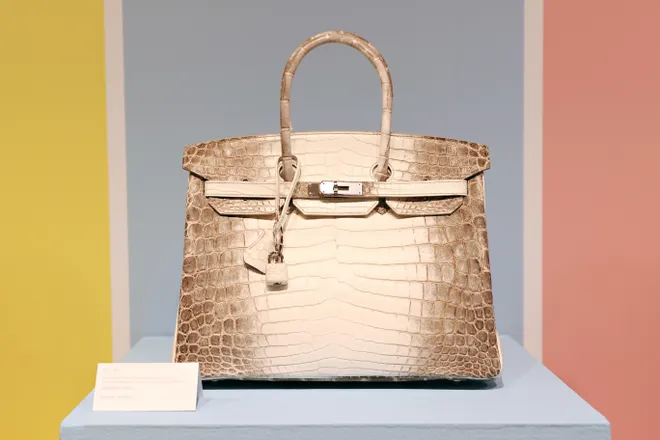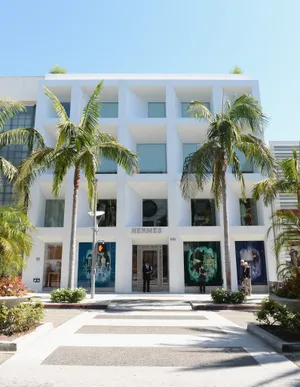Hermès Birkin accused of exploiting customers in class-action lawsuit filed in California
Two California-based Americans have sued French luxury house Hermès, alleging that the company unlawfully limits customers by only allowing those who have "sufficient purchase history" with the brand to buy its famed Birkin handbags.
In a lawsuit filed Tuesday in San Francisco, the two Americans, Tina Cavalleri and Mark Glinoga, allege that Hermès is violating antitrust law by “tying” the sale of one item to the purchase of another and exploiting their market power. According to the lawsuit, company's sales associates force customers to buy other Hermès products such as shoes, scarves and jewelry so they can get an opportunity to get their hands on the famed Birkin.
"The unique desirability, incredible demand and low supply of Birkin handbags gives [the brand] incredible market power," the lawsuit reads. "Defendants [Hermès] implemented a scheme to exploit this market power by requiring consumers to purchase other, ancillary products from [them] before they will be given an opportunity to purchase a Birkin handbag. With this scheme [the brand was] able to effectively increase the price of Birkin handbags and, thus, the profits that Defendants earn from Birkin handbags."
Why is the Hermès Birkin bag special?

Birkin handbags, exclusively produced by Hermès, are a "symbol of rarefied wealth" and an “icon of fashion,” according to the lawsuit. Each handbag is meticulously "handcrafted from the finest leather by experienced artisans in France," and takes many hours to manufacture, adding to the novelty value and price.
"The price of a Birkin handbag (can range) from thousands of dollars to over one hundred thousand dollars," the lawsuit states.
However, despite its high price and exclusivity, "the Birkin handbag has become a household name and well known by the general public, both in name and by its distinctive design," according to the lawsuit.

How can you buy a Hermès Birkin?
As a highly prized, luxury designer product, the Birkin is not available to purchase online or over the counter at a Hermès store. In fact, they are not even displayed for sale in the company’s retail stores, according to the lawsuit.
“Typically, only those consumers who are deemed worthy of purchasing a Birkin handbag will be shown a Birkin handbag (in a private room),” says the lawsuit, adding that though the brand's sales associates do not earn commissions on Birkin bag sales, they are instructed to use the handbags "as a way to coerce consumers to purchase ancillary products such as shoes, scarves, belts, jewelry and home goods."
Even then, customers who are chosen to purchase a Birkin only have the opportunity to purchase the specific bag shown to them and cannot order one of their choice.
According to the lawsuit, Cavalleri spent tens of thousands of dollars on ancillary products at Hermès "in order to obtain access to Hermès Birkin bags."
However, when she contacted Hermes in 2022 about purchasing another Birkin bag, she was told that that the specialty bags would be going to “clients who have been consistent in supporting" the business. Cavalleri said this meant she would have had to spend an additional few thousand dollars on ancillary products if she wanted to access to another Birkin Handbag.
Similarly, Glinoga planned to purchase a Birkin handbag in 2023 but was advised by a sales associate to purchase ancillary products if he wanted a chance to "obtain a Birkin Handbag." The lawsuit said that Glinoga made "multiple attempts to purchase a Birkin bag but was told on each occasion he needed to purchase other items and accessories."
While the lawsuit did not specify how much the two plaintiffs were expected to spend, a Reddit user shared that she spent around $20,000 on various Hermès products including a Nantucket watch, a Bearn wallet, a pair of day sneakers, dinnerware and scarves before she was offered a Birken bag.
The user added that her relationship with the sales associate also contributed towards her offer to purchase the coveted item.

The lawsuit aims to seek class action status for thousands of U.S. consumers who bought, or were asked to purchase ancillary products from Hermès in order to purchase a Birkin. The lawsuit describes “ancillary products” as all those sold at Hermès’ branded retail boutiques "except for any Birkin, Kelly or Constance branded handbag".
Cavalleri and Glinoga are also seeking monetary damages, the amount for which has not been specified, and a court order barring Hermes' from their allegedly anticompetitive practices.
Hermes operates about 43 stores in the United States, including eight in California, according to Reuters.
Cashless entry lawsuit:National Park Service sued over cashless entry at parks, historic sites across US
Saman Shafiq is a trending news reporter for USA TODAY. Reach her at sshafiq@gannett.com and follow her on X, the platform formerly known as Twitter @saman_shafiq7.
Disclaimer: The copyright of this article belongs to the original author. Reposting this article is solely for the purpose of information dissemination and does not constitute any investment advice. If there is any infringement, please contact us immediately. We will make corrections or deletions as necessary. Thank you.







